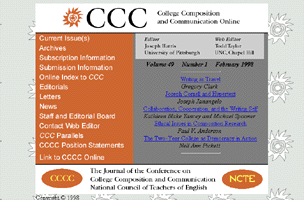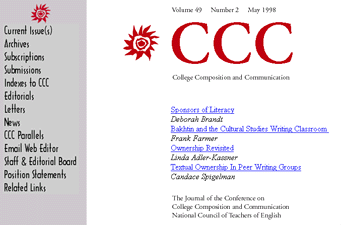
Kairos Editor Mick Doherty asked if I would share a few thoughts about the work I have been doing for another Web journal: CCC Online. As I sat down to write (or I should say "sat down to revise") this piece, I am once again struck by the differences between electronic and conventional publication. In print, how often do we read guest editorials about a journal other than the one in which the editorial is being published? Never? Yet, Mick's request, and in fact the relevance of this editorial, don't seem so odd online, particularly in Kairos. What follows is more or less a reprint of the editorial I prepared for the inaugural edition of CCC Online. Funny, dual submission/publication also seems to make sense under certain circumstances in the new media. This is good.
In his February 1997 editorial "Virtual Citings," Joseph Harris wrote, "as crucial as it is that CCC continue to serve as a site for critical dialogue on electronic discourse, it also seems clear that the journal must itself venture into cyberspace, establish a presence online" (8). Harris asked me to serve as Web Editor because he no doubt thought I knew my way around cyberspace. Truth is, I myself would also like to consult with someone who knows his or her way around cyberspace, but I doubt she has been born yet.
Johndan Johnson-Eilola once noted the psychological ambivalence, the "vertigo" and "euphoria," associated with writing and publishing in the new media, especially hypertext. Vertigo, euphoria, chaos, order: these words describe the experience of creating CCC Online, and similar words will, no doubt, characterize the experience of reading (and interacting with?) it. On the one hand, creating something new and realizing that certain aspects of the project (like uploading copies of CCCC Position Statements) would help large numbers of readers was a thrill. On the other, negotiating the vertigo of cyberspace was a struggle. For example, due to such disorientation, CCC Online went through three different designs before Harris and I settled on the format which first appeared in March 1998.

The image above shows what CCC Online Version 2.2 looked like. It was fully developed and ready to publish in November 1997 until Microsoft Internet Explorer 4.0 emerged and changed the terrain of Web design.

This photograph (from January 1998) documents the end of the four-hour white-board session required to map the overhaul of the previous design, leading to the interface design below.

Our initial plan for CCC Online was merely to produce a Web version of the journal more or less exactly as it appeared in print. We consciously took a conservative introductory approach to the project, thinking that over time as we learned to negotiate the order and chaos, CCC Online would evolve into something more experimental and more native to the Internet. Before taking on this project, I had already learned at least one important lesson about publishing in the new media: better to think small at first and then allow your plans to expand into the vast possibilities online communication offers rather than vice versa.
While attempting to build the first electronic page for CCC Online, though, I found it impossible to replicate the print format. The opening page should promote the current issue, right? But how best to define the current issue of an online edition of a print journal: as the one already mailed to subscribers or as the version on which the contributors and editors have been working for months but which currently languishes in production? Which "issue" might readers find more important online: the last one or the next one? Or, can we promote both versions equally and effectively? If so, journal editors will need to re-imagine the parameters, definitions, and functions of one of the most rudimentary concepts of journal publishing, namely, the so-called newsstand or current issue.
Consequently, establishing a "presence online," as Harris's editorial calls for, has meant more than simply intercepting and uploading the journal's electronic files as they travel from the typesetter to the printer. There's more at stake here than just (re)presenting CCC on the Web. I agreed to serve as the Web Editor for this journal because I firmly believe that the Internet is superior to paper as a medium for archiving, distributing, and sharing most of the research, scholarship, and information in our field. I am convinced that increasing access to this body of work will benefit our profession and, concomitantly, our students. However, the prospect of publishing scholarship online raises a host of intellectual and political issues. Among them is the fact that online scholarship currently lacks credibility, particularly in the humanities and especially on many hiring and promotion committees. One of my primary goals for CCC Online, therefore, has been to increase the legitimacy of electronic publication and to help make a productive transition to a new era of scholarly publication.
Although the driving force behind CCC Online may have initially been the threat of being left behind by the Internet bandwagon (for example, another organization had already grabbed our ideal URL, "ccc.org," before we could), the principles that now determine its shape and purpose are more proactive. Despite the chaos and vertigo, Harris and I agreed that two primary goals should guide this site:
CCC Online also increases the scholarly value of CCC by improving the possibilities for dialogue between authors, readers, and the texts published in CCC. Authors of letters to the editor (of CCC or any publication for that matter) often seem to find themselves at a disadvantage because they almost never get the last word. Not so with CCC Online; it allows authors, respondents, critics, and fans to continue productive Interchanges at length through published e-mail to the Web Editor. CCC Online also extends the boundaries of scholarship through its Parallels feature that provides an electronic archive for CCC authors who wish to complement their articles in print with images, hypertexts, lengthy appendices, etc.
In terms of serving our readers, CCC Online also includes the same important information for members of CCCC regularly published in CCC such as CCCC news and announcements, guidelines for submission to CCC, subscription information, and editorials. Unlike the print version, CCC Online can archive such information in a central place, including essential resources such as CCCC Position Statements and hypertextual links to other field-related Web sites.
The drive to serve the needs of CCC subscribers and CCCC constituents, ironically, explains why the initial format for CCC Online does not include full-text copies of the articles in print--a prominent difference between the two versions. I predict that full-text copies of the complete contents of CCC will be available online sooner than later (almost certainly within five years), but doing so will take careful study and approval by the CCCC Executive Committee and the Editorial Board of CCC. We need to assess the potential impact that free online access might have on subscriptions and annual dues. It is likely, however, that free online access to CCC will actually increase the volume of print subscribers, as publishers of other e-journals have found. Paid subscribers may soon receive through password security full-text access to the entire contents of CCC, while access for everyone else remains limited (much like the current version(s) of The Chronicle of Higher Education).
We hope CCC Online works well for readers like you. If not, or if you have any suggestions for improving the site, please send responses via e-mail to the Web Editor at ccc-web@serv1.ncte.org. CCC Online will go through many changes and improvements (as the print journal has); CCC's readers will no doubt play a primary role in helping negotiate the vertigo and euphoria of the new media and in working to resolve many of the current issues accompanying online publishing.
Works Cited:
Johnson-Eilola, Johndan. "Reading and Writing in Hypertext: Vertigo and Euphoria." Literacy and Computers: The Complications of Teaching and Learning with Technology. Ed. Cynthia L. Selfe and Susan Hilligoss. New York: MLA, 1994. 195-219.